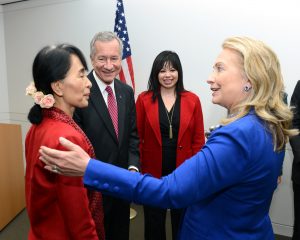If Western governments still harbored any optimism about Myanmar’s political trajectory since political reforms began in earnest a decade ago, it was cleanly swept aside by the military’s seizure of power in the early hours of February 1. Governments around the world have since scrambled to respond to the sudden detention of State Counselor Aung San Suu Kyi, leading members of her National League for Democracy (NLD), and the effective abrogation of the party’s landslide victory at last year’s election.
The coup poses thorny challenges for Western powers – none so much, perhaps, as the United States. There is a seeming irony in the fact that the Biden administration’s first great foreign policy challenge involves a country widely seen as the Obama administration’s greatest foreign policy achievement.
During the Obama years, U.S. values and interests seemed neatly to align in Myanmar: the country’s democratic opening, encouraged by Washington, coincided with a thickening of relations with Western democracies and a pushback against the smothering influence of China. But the Tatmadaw’s seizure of power, which follows its vicious ethnic cleansing of Rohingya Muslim communities from western Myanmar, now stands as a textbook example of the growing tension between values and interests in U.S. foreign policy.
As expected, Washington has come out strongly against the Tatmadaw’s coup. “The United States removed sanctions on Burma over the past decade based on progress toward democracy. The reversal of that progress will necessitate an immediate review of our sanction laws and authorities, followed by appropriate action,” President Joe Biden said in a statement. His comments echoed, with some variations, the statements quickly issued by other Western democracies. It was also largely consistent with his administration’s promise to foreground democratic advocacy after the tumult of the Trump years.
But as the BBC’s Southeast Asia correspondent Jonathan Head noted, “international censure of the coup at this stage is more virtue-signaling than real policy. The tougher discussions on how to respond have yet to happen.” And on that front, there are no easy answers for Washington. As of publication, the Biden administration was reportedly engaged in an internal debate about whether to call the military takeover a “coup d’etat,” which would prompt automatic retaliation under U.S. law, potentially constraining its freedom of maneuver.
Whatever term it uses, however, Biden’s statement – and a similar comment by White House spokesperson Jen Psaki in the immediate aftermath of the coup – seems to imply a possible reimposition (or tightening) of economic sanctions on Myanmar.
Sanctions are a blunt instrument, however, and carry many potential risks. First, a method that has failed in the past is very unlikely to succeed in the present. The U.S. and other Western nations imposed sweeping sanctions and trade bans on Myanmar in the years following the Tatmadaw’s violent crackdown on mass public demonstrations in 1988, but these did little to loosen its grip on power.
During those years, the Myanmar military showed that it was willing and able to weather considerable international pressure, even if it imposed immense suffering on Myanmar’s people. Add to this the fact that the country’s new de facto leader, Tatmadaw Commander-in-Chief Min Aung Hlaing, has already been personally sanctioned for his role in the ethnic cleansing of the Rohingya Muslims in 2017 – a measure that obviously did nothing to dissuade his present course of action.
Second, it would be inhumane to impose sanctions that might damage Myanmar’s economy, right at the moment that the country is struggling with a precipitous economic downturn and rising poverty due to COVID-19.
Third, and perhaps most intractably, are the likely strategic ramifications. The past two decades have seen a persistent pattern in Southeast Asian diplomacy, one that approaches an iron law: when the U.S. and other Western governments pressure the region’s governments on questions of human rights and democratic backsliding, they have predictably turned to China as an escape valve from Western pressure.
China has its own reasons to be unhappy with the “major cabinet reshuffle” in Naypyidaw, as the state media outlet Xinhua amusingly termed it. It will likely face considerable challenges from the military, which harbors a deep suspicion of Chinese intentions dating back to the early part of the Cold War. But Beijing nonetheless stands ready to capitalize from any serious alienation between Myanmar and the West, as it has already done in the wake of the Rohingya crisis.
This is something that the new U.S. administration no doubt understands. As Singapore’s Bilahari Kausikan noted today, Kurt Campbell, now coordinator for the Indo-Pacific in the White House, and assistant secretary of state in the first Obama administration, was one of the architects of the opening to Myanmar. He is therefore “aware of the futility of isolating Myanmar” and the strategic importance of the country in terms of China. But it remains to be seen how the Biden administration will manage to square its promises of democratic advocacy with Asia’s changing strategic realities.
All this sits downstream of a much broader shift. The American victory in the Cold War gave way to a rare unipolar moment, one in which the U.S. set the global agenda, and in which American policymakers could imagine that values and interests ran in parallel lines. Over the past decade, this has given way to a world of increasing multipolarity and complexity in which the post-Cold War liberal consensus anchored by U.S. power is under increasing challenge, from China, but also from many other postcolonial states in the Global South.
In terms of its personnel, the Biden administration has a clear restorationist bent, resembling something like an Obama administration redux. Myanmar now looms as an early test of whether it believes it is dealing with the world of 2009, or the world of 2021.

































